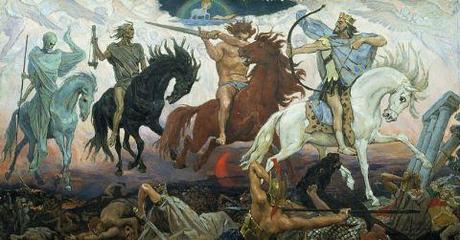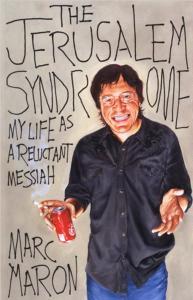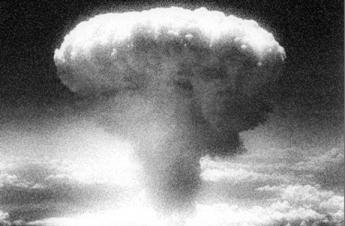
If these eyes could talk…Thank God for the mouth below them.
Patton Oswalt: Yeah, we had in our garage we had a treadmill, and [laughs] then we had a dent-free heavy bag. [laughs] Clearly never been hit. Just smooth as the day it was bought—
Marc Maron: What was the day that Patton Oswalt decided I gotta get a punching bag?
PO: I gotta get a heavy bag, in my mind, I’m like—
MM: What were you preparing for?
PO: In my mind there’s always gonna be—the world’s gonna freeze, and we’re gonna have to fend for ourselves, I—
MM: So you’re gonna train at that moment?
PO: In the back of my mind, I’m like, I should learn to make fire, I should learn to, you know, set a—
MM: You should be trained when that happens, it’s not when the shit goes down, you’re like “Hold on!”—Poof! Poof!—
PO: Yeah, give me ten minutes, I’m ready. Get out there with Viggo Mortensen.
MM: Do you really have that fear?
PO: Oh, totally. Yeah. And it gets worse and worse.
MM: How do you think it’s going to go down?
(WTF, Episode 144, 1/27/2011)
For almost two years I’ve pictured a story in my head, cinematically. It starts off small, like an indie film. Just a collection of friends, five or six, gathered around a dining table. They are drinking wine, tearing at the end of a baguette, smoking pot, and sitting before plates mostly empty but for the bits of food not consumed for whatever reason. The meal is over, but the stories continue. They are comedians, so the potluck of anecdotes is larger than the small feast they consumed. Patton Oswalt sits there, so does Marc Maron, and we fade in to the opening scene with the preceding conversation clearly part of a bigger picture.
The movie in my mind goes from My Dinner with Andre towards a cross between The Mist and The Road Warrior. Speculation becomes reality, and our cast of stand-ups cross paths again in the desolate realities they face surviving the end of civilization. Like the focus of our story starting small and eventually stretched across a bleak dystopian landscape, the humor would begin in the details of human interaction, then grow melodramatic—Marc Maron hoarding Pringles cans that Patton Oswalt convoys through a vampire Nazi blockade towards the promise of salvation in Sunnyvale, California. Rooster T. Feathers their safe haven.
Stand-up comedy is not an easy trade. The travel. The loud drunks. The louder bachelorette parties. From the basements that seat twenty but bring in five, to the corporate gigs where your act becomes background noise for the hot-tray buffet, the stand-up comic lives to suffer then tell you about it in his set. All for laughs. The nature of their work breeds self-sufficiency, while inherent flaws in their personality winnow their ranks to the limits of those who escape narcotics, alcoholism, and mediocrity. Their lowly rung in the show biz ladder has allowed them a prime seat to the decline and fall of Hollywood’s hegemony over popular entertainment. In the wake of Babylon’s destruction, wireless communications have left comedians and cockroaches in charge.
Enter the podcast, a medium built for introspection post apocalypse. Many comedians have taken to the form, but the first to plant their flag, expressed by Jay Mohr to Adam Carolla on his podcast, were:
Jay Mohr: There’s like three guys, four, that really got the ball rolling for all of us. You’re the Lewis and Clarke of podcasting. We all followed in your footsteps. You, Kevin Smith, Rogan was way out in front of it, and uh, Maron. You guys are like the tip, tip, tip, tip, tip, tip, tip of the spear.
(Mohr Stories, Episode 102, 10/28/2012)
Adam Carolla can build the New Jerusalem, with a background in carpentry and general contracting. Joe Rogan can defend the New Jerusalem, with his knowledge of mixed martial arts. In a pinch they could eat Kevin Smith, provided he’s kosher in New Jerusalem. But what role would a scrawny, borderline-anorexic, rehabilitated addict like Marc Maron play?

Carolla, Rogan, Smith, and Maron
On September 1, 2009, Marc Maron was at a crossroads, and asked himself the philosophical question, What the fuck? As a comic he had spent over twenty years looking for professional recognition and popular success. Starting in Boston during college, he moved to LA after graduation, then eventually back to Boston when the pace set by Sam Kinison got to him. He then followed the avant-garde to San Francisco, moved to New York for work on television, then LA, then New York and LA. Cast off of Air America that summer, it seemed the last stop on a tour of abortive wandering. Maron had spent years wallowing in the muddy tread of show business—what originally captured his attention.
Marc Maron: I remember I met Jimmy Durante when I was a kid. My grandmother—we were in Vegas—we met my grandmother in Vegas. I must’ve been nine or ten. We grew up in New Mexico, they come from Jersey. We go to Vegas. And somehow or another she found out Jimmy Durante’s room number. And, you know, I didn’t know Jimmy Durante. She knew Jimmy Durante. But by that time he was already in his seventies.
Kliph Nesteroff: Right.
MM: And she’s like, let’s go meet him. And Cha, cha, cha, cha! [laughs] So we go to this room, and my grandmother knocks on the door, and an old man with no makeup, no hair, in a wife beater, like, horrendous looking, opens the door, and goes “Hello.” And I’m like Oh my God, who is this guy? [laughs] And my grandmother is like, “Hello, Mr. Durante, this is my grandson”—who’s terrified. You know, and he did the little, “Cha, cha, cha, cha!” And I’m like, Great, why did we bother that guy? But from that moment on—and also I saw Jackie Vernon when I like was eleven. And I loved Jackie Vernon. I saw him on TV with the slideshow thing, I thought it was hilarious. So he comes to Albuquerque, played some lounge at a Hilton hotel, and my parents took me, I must’ve been twelve, eleven or twelve. And just sitting right there on the stage, and having seen a guy on TV do this thing, and then seeing this fat, sweaty, you know, guy with a worn-out tux collar. You know, just like, there was something there that—the humanity of it—was so profoundly more interesting to me than what was happening on television. Which I think that moment probably dictated why I ended up where I am.
(WTF, Episode 314, 9/13/2012)
Clean, sober, divorced, and unemployed, Marc Maron saw the end of the conventional line in 2009, and did what any desperate man should do: he called his friends. What most of us wouldn’t have considered was recording the conversations for digital download every Monday and Thursday. WTF—the initials to his philosophical question—became an audio show scrutinizing Maron’s personal ontology while recovering modern comedy’s epistemology through dialogue.
Friends he had some. Disgruntled professional acquaintances he had more, picked up at every stop. And reckoning a fearless moral inventory of his past misdeeds, Maron sought interviews with those whose bridges he’d burnt while they were on them. Starting most of his interviews with an apology, and ending them with an “Are we good?” Maron invited the audience into his personal recovery like the circle of trust at group therapy, and that’s all any recovery group wants: brutal honesty told well.
By the time Marc Maron released his Keynote address at Montreal’s Just for Laughs Comedy Festival, on July 29, 2011, he had not only turned the page, but changed the ending.
Marc Maron: …Alright, so, back to the offer of this speech. I thought like, wait, alright, that’s the reason they want me to do this speech: I do a podcast out of my garage that has had over twenty million downloads in less than two years; it’s critically acclaimed; I’ve interviewed over two hundred comics; I’ve created live shows; I am writing a book; I have a loyal borderline-obsessive fan-base who bring me baked goods and artwork; I have evolved as a person, as a performer; I’m at the top of my game and no one can tell me what to do! I built it myself, I work for myself, I have full creative freedom. I am the future of show business! Not your show business, my show business! They want me to do this speech because I am the future of our industry! That’s what I thought, like, I really thought that. Then my new manager got back to me and said, ‘No, they liked the jokes you did when you introduced Kindler a couple of years ago. That’s why they asked you.’ [laughs] So this moment of, like—I was an emperor in my garage for about six minutes.
…
I’m not a household name. I’m not a huge comic. I have not made millions of dollars but I’m okay. I’m making a living. I’m good with that, finally. Comedy saved my life but also destroyed it, in many ways. This is—it’s the precarious balance of our craft and some of us don’t survive it.
(WTF, 7/29/2011)

Jesus?
Maron takes the mortality of it seriously, and reborn digitally connects with those needing salvation. Marc Maron is at most New Jerusalem’s Messiah, even if he’s reluctant, and at the very least their Saint John the Divine, only funny. Very funny. There have been times in all our lives when we’ve needed the salvation of comedy. When Marc Maron interviewed Jack Gallagher—a comic Maron knew from his earliest days in Boston—he gave Gallagher a chance to distinguish himself from the melon-pounding comic of identical surname. He also gave Gallagher the forum to explain his one-man show coming to terms with raising a son on the spectrum for autism. Episode 218 dates to October 13, 2011, and I had only learned a few months before of my own child’s diagnosis for the same condition. Thanks to Marc Maron, I wrote Jack Gallagher a note of thanks, and bought a copy of his show, A Different Kind of Cool. Thanks to WTF I learned it wouldn’t be the end of the world.

